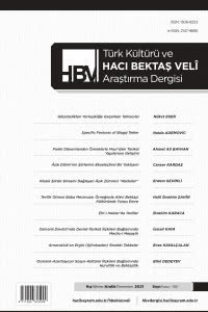Lecco’da Yirmi Beş Tokatlı Türk Alevi ve “Alevi Bektaşi İtalya”nın Kurulması
Alevi Kültür Merkezleri, İtalyan Alevi Derneği, Tokat, Lecco
THE TWENTY-FIVE TURKISH ALAWI FROM TOKAT AND THE CREATION OF THE ALAWITE BEKTASHI ITALIA IN LECCO
Alawi Cultural Centres, Italian Alawi Association, Tokat, Lecco,
___
- Amelina A. and Faist T. (2008). “Turkish Migrant Associations in Germany: Between Integration Pressure and Transnational Linkages”. Revue européenne des migrations internationals 24, 91-120.
- Atac et al. (2014). “Turkish migrants and their descendants in Austria Patterns of exclusion and individual and political responses”. Migration Letters 1, 263- 274.
- Bellér-Hann, I. and Hann, C. (2001). Turkish region: state, market and social identities on the East Black Sea coast. Oxford: James Currey.
- ——. (2015). The Rise of Political Islam in Turkey: Urban Poverty, Grassroots Activism and Islamic Fundamentalism. London: I.B. Tauris.
- Delibas, K. (2016). “Negotiating and Maintaining Identity in the Urban Jungle. Alevi Organizations and Alevi Identity in Izmir”, in Mollica M. (ed), Fundamentalism. Ethnographies on Minorities, Discrimination and Transnationalism. Munster: LIT Munster
- Drake, R., (1995). The Aldo Moro Murder Case. Cambridge: Harvard University Press.
- Erdal G. et al, (2007). “Energy use and economical analysis of sugar beet production in Tokat province of Turkey”. Energy 32,35-41.
- Esegun K. et al. (2007). “An economic analysis and energy use in stake-tomato production in Tokat province of Turkey”, Renewable Energy 32,1873-1881.
- Giaffreda, G., (2007). (ed.), I beati martiri di Otranto. Galatina: Edizioni del Grifo.
- Gürcan, E.F. and Berk, M. (2017). Neoliberalism and the Changing Face of Unionism: The Combined and Uneven Development of Class Capacities in Turkey. London: Palgrave Macmillan.
- Houben, H., (2008). ‘La conquista turca di Otranto (1480) tra storia e mito’, in Atti del Convegno internazionale di studio Otranto-Muro Leccese. Galatina: Congedo.
- Kizilaslan H. (2009). “Input–output energy analysis of cherries production in Tokat Province of Turkey”. Applied Energy 86, 1354-1358.
- Linde, C. (1993). Life Stories: The Creation of Coherence. Oxford: Oxford University Press.
- Lievens, J. (1999). “Family-Forming Migration from Turkey and Morocco to Belgium: The Demand for Marriage Partners from the Countries of Origin”. International Migration Review 33(3), 717-744.
- Mollica, M. (2012). ‘The Alevi Cultural Centre in Horn-St Gallen, Switzerland: An Exploratory Study’, in II. Uluslararasi Tarihten Bugüne. Alevilik Sempozyumu. A, Erdemir et al. (eds.), 133-150. Ankara: Cem Vakfi.
- Morleo, A., (2017). Doccia gelata su Lecco: Valmadrera verso il multisala (https:// www.ilgiorno.it/lecco/cronaca/cinema-valmadrera-1.3509932).
- Motta, G., ed, (2000). I turchi, il Mediterraneo e l’Europa. Milan: Franco Angeli.
- Moussa, M. (1987). Extremist Shiites: The Ghulat Sects. Syracuse: Syracuse University Press.
- Muti, G., (2015). Il lago di Como. Turismo, territorio, immagine. Milan: Unicopli.
- Öniş, Z. and Şenses, F. eds., (2009). Turkey and the Global Economy: Neoliberal Restructuring and Integration in the Post-Crisis Era. London: Routledge.
- Peron, E., (2017). Storia di Como dalle origini ai nostri giorni, Bibl. dell’Immagine: Pordenone
- Regulation European Union Council 539/2001.
- Rostagno, C., (2005). Lecco contemporanea 1900-1960. Lecco: Cesarani.
- Rosenwald, G. and Ochberd, R. (1992). Storied Lives: The Cultural Politics of Self- Understanding. New Haven: Yale University Press.
- Sökefeld M. (2002). “Alevi Dedes in the German Diaspora: The Transformation of a Religious Institution”, Zeitschrift für Ethnologie 127(2), 163-186.
- ——. (2003). “Alevis in Germany and the Politics of Recognition”, New Perspectives on Turkey 29, 133-161.
- ——. (2004). “Religion or culture? Concepts of identity in the Alevi diaspora”, in Waltraud Kokot, Khachig Tölölyan and Carolin Alfonso (eds.) Diaspora, Identity and Religion: New Directions in Theory and Research. 133-155 London: Routledge.
- ——. (2008). Struggling for Recognition: The Alevi Movement in Germany and in Transnational Space. Oxford: Berghahn Books.
- Sella D. (2014). Italy in the Seventeenth Century. London: Routledge.
- Visintainer, E., (2011). La Presenza Turca Dimenticata In Italia: i Turchi Di Moena. Ankara: Orsam.
- Yalman, G. (2009). Transition to Neoliberalism: The Case of Turkey in the 1980s. Istanbul: Bilgi University Press.
- ISSN: 1306-8253
- Yayın Aralığı: Yılda 4 Sayı
- Başlangıç: 1994
- Yayıncı: Ankara Hacı Bayram Veli Üniversitesi Türk Kültürü Açısından Hacı Bektaş-ı Veli Araştırmaları Uygulama ve Araştırma Merkezi
MEVLANA HİMMETÎ’NİN TÜRKÇE DİVANI VE BU DİVANDA HZ. ALİ’NİN YERİ
ÂŞIK VEYSEL’İN TÜRKÜLERİNDE ALEVİ VE BEKTAŞİ KÜLTÜRÜNÜN İZLERİ
Fulya SOYLU BAĞÇECİ, Mine ŞENOL ATICI
ALEVİ-BEKTAŞİ KÜLTÜR ORTAMINDA MÜZİĞİ TEMSİL EDEN KADINLAR
TUNCELİ VE ÇEVRESİNDEN DERLENEN İKİ SEMAH: MARAŞ SEMAHI VE KIRKLAR SEMAHI
ALEVİLİK - MÜZİK İLİŞKİSİNE YÖNELİK FENOMENOLOJİK BİR YAKLAŞIM (TUNCELİ ÖRNEĞİ)
Aziz ERDOĞAN, N. Oya LEVENDOĞLU, Cenk GÜRAY
CEM RİTÜELLERİNDE KÜLTÜREL BELLEK OLUŞTURMA
ANSİKLOPEDİ VE SÖZLÜKLERDE ALEVİLİK KAVRAMININ ÇERÇEVELENME BİÇİMLERİ
Zakir AVŞAR, Ayşe Elif EMRE KAYA, Songül OMUR
Ahmet Taşğın, Kalemle Resmedilen Alevilik, Çizgi Kitabevi Yayınları, Konya, 2019
Ahmet TAŞĞIN, Kalemle Resmedilen Alevilik, Çizgi Kitabevi Yayınları, Konya, 2019
